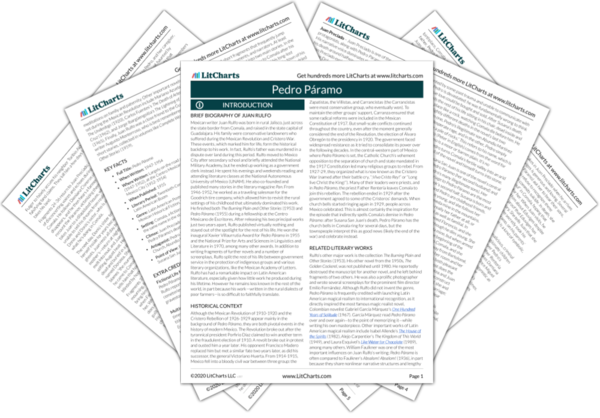Father Rentería Quotes in Pedro Páramo
Shooting stars. One by one, the lights in Comala went out.
Then the sky took over the night.
Father Renteria tossed and turned in his bed, unable to sleep.
It’s all my fault, he told himself. Everything that’s happening. Because I’m afraid to offend the people who provide for me. It’s true; I owe them my livelihood. I get nothing from the poor and God knows prayers don’t fill a stomach. That’s how it’s been up to now. And we’re seeing the consequences. All my fault. I have betrayed those who love me and who have put their faith in me and come to me to intercede on their behalf with God. What has their faith won them? Heaven? Or the purification of their souls?
“We live in a land in which everything grows, thanks to God’s providence; but everything that grows is bitter. That is our curse.”
“You’re right, Father. I’ve tried to grow grapes over in Comala. They don’t bear. Only guavas and oranges: bitter oranges and bitter guavas. I’ve forgotten the taste of sweet fruit. Do you remember the China guavas we had in the seminary? The peaches? The tangerines that shed their skin at a touch? I brought seeds here. A few, just a small pouch. Afterward, I felt it would have been better to leave them where they were, since I only brought them here to die.”
“And yet, Father, they say that the earth of Comala is good. What a shame the land is all in the hands of one man.”

Father Rentería Quotes in Pedro Páramo
Shooting stars. One by one, the lights in Comala went out.
Then the sky took over the night.
Father Renteria tossed and turned in his bed, unable to sleep.
It’s all my fault, he told himself. Everything that’s happening. Because I’m afraid to offend the people who provide for me. It’s true; I owe them my livelihood. I get nothing from the poor and God knows prayers don’t fill a stomach. That’s how it’s been up to now. And we’re seeing the consequences. All my fault. I have betrayed those who love me and who have put their faith in me and come to me to intercede on their behalf with God. What has their faith won them? Heaven? Or the purification of their souls?
“We live in a land in which everything grows, thanks to God’s providence; but everything that grows is bitter. That is our curse.”
“You’re right, Father. I’ve tried to grow grapes over in Comala. They don’t bear. Only guavas and oranges: bitter oranges and bitter guavas. I’ve forgotten the taste of sweet fruit. Do you remember the China guavas we had in the seminary? The peaches? The tangerines that shed their skin at a touch? I brought seeds here. A few, just a small pouch. Afterward, I felt it would have been better to leave them where they were, since I only brought them here to die.”
“And yet, Father, they say that the earth of Comala is good. What a shame the land is all in the hands of one man.”











